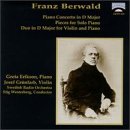| All Artists: Franz Berwald, Stig Westerberg, Swedish Radio Orchestra, Greta Erikson Title: Berwald: Piano Concerto; Piano Works; Duo in D Members Wishing: 0 Total Copies: 0 Label: Genesis Records Release Date: 8/18/1998 Genre: Classical Styles: Chamber Music, Forms & Genres, Concertos, Rondos, Short Forms, Historical Periods, Classical (c.1770-1830), Instruments, Strings Number of Discs: 1 SwapaCD Credits: 1 UPC: 009414811127 |
Search - Franz Berwald, Stig Westerberg, Swedish Radio Orchestra :: Berwald: Piano Concerto; Piano Works; Duo in D
 | Franz Berwald, Stig Westerberg, Swedish Radio Orchestra Berwald: Piano Concerto; Piano Works; Duo in D Genre: Classical
|
Larger Image |
CD Details |
CD ReviewsA BERWALDIAN "COMPOTE" Melvyn M. Sobel | Freeport (Long Island), New York | 08/20/2001 (5 out of 5 stars) "Swedish-born composer, Franz Berwald (1796-1868), lived a most curious life, during which, for the most part, his music was entirely neglected. Maybe this is why he always appears so dour in archival photos; in some he appears dead! Sitting up! Did the man ever smile? Well, I suppose when you're gifted with a natural musical talent and a keen desire to compose, but seem to be squelched, for one reason or another, at every turn throughout your entire life, this might tend to twist the bowels a mite. Franz was certainly not a happy camper. Fact is: He seemed to do everything BUT have the time or money to do what his heart longed to do... compose music. He became a physiotherapist, managed a glass factory, bounced all over Europe, coddled up to famous composers (like Mendelssohn), even managed to squeeze in a few substantial works (e.g. his four symphonies of 1841-45), but all for naught. Dead ends awaited him perpetually. (I suppose this could constipate even the strongest of constitutions!)
However, Berwald pressed ever onward, regardless, the greatest compositions coming at the twilight of his years and, yes, STILL substantially unrecognized, unapplauded. Franz's lot was not a happy one. I doubt I would have smiled, either. A Berwald revival, of sorts, began about one hundred years after his death, when pioneering companies like Nonesuch, Genesis and Vox released LPs with music by--- Franz who??? It didn't take us long to catch the fever. This was the 70s, and Pandora's Box was open and brimming with composers whose names were known only to the writers of GROVE'S DICTIONARY... a few arcane musicologists with Coke-bottle glasses... or fearless entrepreneurs. Now, though, these "lost" composers poured forth over the edge... with their music and their faces. It was a time of plenty, and magical! The present 1998 Genesis CD, from a 1972 LP, is a prime example of what I would call "magical." For most of us, it was our first introduction to... anything... Berwald, our first glimpse at the man, and the composer. And what a glimpse it was! All those new pieces of music staring out at us! Like the ingratiating Piano Concerto in D (1855), whose every movement (played without pause) turns delight upon delight, as in the beautifully lyrical second subject of the opening Allegro, the haunting melodies of the Andantino, or the Mendelssohnian ripplings of the Allegro finale. Introductions like this make lasting impressions, especially when played so lovingly by pianist Greta Erikson. The Piano Concerto is a plum, ripe and delicious. The piano works, cherries, all, initiated us, again, into Berwald's "unheard" world. The Theme and Variations in G Minor and the Rondeau in B-Flat (1818-20), although works of a young man, are still well-developed compositions, splendid in a subdued melancholy, just below the more extrovert surfaces, that immediately piques our curiosity. The frothy Tempo di Marcia in E-Flat sounds like a chip from Beethoven's bagatelle workbench that the maestro somehow overlooked. However, with the Presto Feroce (fr. Three Pieces for Piano, 1859-60) we jump forty years to encounter a composition of more serious effort and gravitas, a work that launches itself immediately with a no-nonsense, listener-grabbing chordal entry, exceptionally exciting!, and proceeds with a rush of rippling and running notes that simply stuns. The development, very much Schubertian in its tone, is fascinating, and the coda, again with notes dotting and dancing (in both hands!) comes to a totally satisfying conclusion with a sustained febrile trilling in the bass. A plump cherry, this. The Duo in D for Violin and Piano (1860), yet another new work for most of us in '72, retains the style of a Berwald we have only become more familiar with recently (through CDs of his piano trios and piano quintets). The longest composition on this Genesis CD (20:17), its three movements gifted by inspiration and melody, with a particularly memorable and lovely Andante (aptly titled, "Romance"), only confirms, for me, that Berwald's neglect, especially during his lifetime, is wretchedly unfathomable. This Duo is a peach! The original LP has transferred remarkably well to CD. Pianist Greta Erikson does a superb job throughout, not least of all in the Piano Concerto, where her nimble touch amazes; as well, violinist Josef Grunfarb is entirely sympathetic to Berwald and is unafraid to show it. The Swedish Radio Orchestra, under Stig Westerberg, is amply idiomatic, too. [Running time: 61:41]" |

 Track Listings (8) - Disc #1
Track Listings (8) - Disc #1